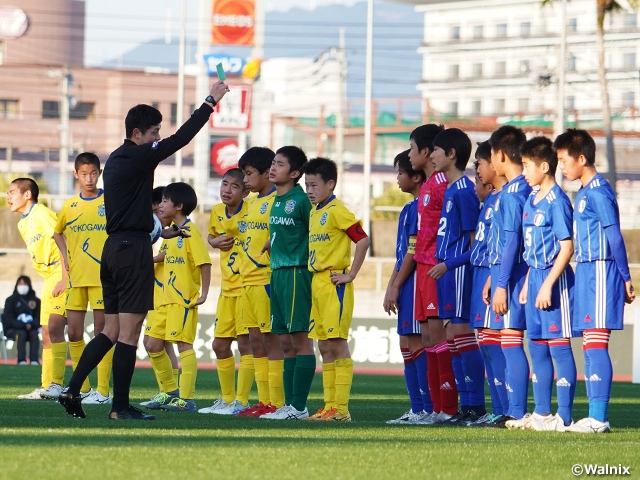NEWS
The purpose of Single-Referee System - Always have respect Vol.114
25 November 2022

Japan Football Association (JFA) disseminates a variety of information towards their registered coaches and referees. Among these was an interesting video on the “single-referee system,” released in September.
Since the time when current JFA President TASHIMA Kohzo served as the Technical Director, JFA has advocated the introduction of eight-a-side football for boys and girls in the primary school age group, and in 2011, the Japan U-12 Football Championship (now the JFA U-12 Japan Football Championship) was changed to an eight-a-side tournament, which led to the introduction of the “single-referee system.”
A football match is generally controlled by three referees. One referee who patrols the pitch and two assistant referees who patrol the touchlines. The assistant referees, as the name suggests, monitor the match from a different angle to aid the referee in making decisions and to judge whether the ball has crossed the touchline or not, and also play an integral role in judging offsides.
At the moment the ball is played by a teammate, whether or not an attacking player was in front of the hindmost player on the opposing defence line, and whether or not that player was involved in the play. It is easy to put into words, but accurately identifying offside is not an easy task at any level of football. Therefore, the duties of the assistant referees are very demanding and come with a significant level of responsibility.
There are still offsides in matches controlled by a single-referee, which means that the referee must make decisions on offsides without the aid of the assistant referees. I occasionally serve as a “single-referee” for my team's intra-squad games, but it is extremely difficult to judge whether a player is offside or not while paying close attention to the action around the ball.
In the video shared by JFA, the key to spotting offside was succinctly depicted as follows. “Monitor the (defending) player acting as the offside line,” while “monitoring the ‘receiver’ and the ‘sender’ of the ball,” “in the same field of view, as much as possible.”
Apart from offside, the video also shared other advice such as, “observe the play up close,” “take an angle from which you can observe the point of action,” “observe the point of action in relation to the whole field,” and “cope with the transitions between offence and defence.”
They all make sense, but they are all easier said than done. Despite all these efforts, referees are often confronted by players and spectators saying, “That was offside!” or “How was that a foul?” This raises the question, why not just have a normal “three-referee system” with two assistant referees? However, there is in fact a reason behind why JFA has introduced the “single-referee system.”
This system is based on the hope that the boys and girls who will be playing football for decades to come will develop a spirit of fair play and respect for referees and their opponents.
Refereeing in football started when a third party was asked to settle disputes between players. In other words, football was originally a game in which players themselves decided whether the ball went out or not, or whether a foul was committed or not.
Even though an eight-a-side football field is half the size of an adult football field, it is still impossible for a single-referee to oversee the entire field. Football should be a game where the players themselves decide when to stop the action, such as when they unintentionally trip over an opponent while attempting to win the ball or when the ball has clearly crossed the touchline. Unbeknownst to the referee, what appears to be a goal could actually be the result of a hand ball. The single-referee system may provide an opportunity for players to acknowledge these situations and foster a spirit of respect for their opponents, the referee, and themselves.
Eight-a-side football and the single-referee system are meant to give boys and girls the opportunity to express their own opinions and ideas while actively participating in the game to help them grow as individuals rather than just listening to the coaches and obeying the referee's decisions. This is something the adults around them must keep in mind.
Written by OSUMI Yoshiyuki (Football Journalist)
*This article was originally posted on the Japan Football Association Newsletter, “JFAnews,” October 2022 edition.
Japan Football Association Newsletter “JFAnews”
The Japan Football Association Newsletter “JFAnews” contains all the information on the Japan National Team, and all the events hosted by the JFA. Tournament results and team information throughout the nation are also available. The official monthly magazine is a must read for coaches, referees, and all members of the football family.
For information on the newest edition (Japanese website)
Related News
-
Respect and fair play
2022/10/26
Let’s stop wasting time and just play - Always have respect Vol.113

-
Respect and fair play
2022/09/26
Soul-stirring battle that lasted for 120 minutes - Always have respect Vol.112

-
Respect and fair play
2022/08/30
What matters most - Always have respect Vol.111

-
Respect and fair play
2022/07/26
Determination and commitment of a referee - Always have respect Vol.110

-
Respect and fair play
2022/06/24
Do primary school children need a national competition? - Always have respect Vol.109

Latest News
-
National Teams
2026/02/19
U-20 Japan Women's National Team short-listed squad & schedule - Training Camp (2/23-26@JFA YUME Field)

-
National Teams
2026/02/19
Japan Beach Soccer National Team short-listed squad & schedule - Training Camp (2/26-3/2@Okinawa)

-
National Teams
2026/02/12
U-17 Japan National Team squad & schedule - Prayer for Peace; Hiroshima International Youth Soccer Games 2025 (2/17-23@Hiroshima)

-
National Teams
2026/02/12
Nadeshiko Japan (Japan Women's National Team) squad & schedule - AFC Women's Asian Cup™ Australia 2026 (2/23-3/22)

-
National Teams
2026/02/09
U-16 Japan Women's National Team short-listed squad & schedule - Training Camp (2/16-19@Okayama)



